 Social Studies
Social Studies  1 Comment
1 Comment In the Trenches
[These are only my experiences and observations. I wouldn’t presume to speak for anyone else, especially not people of color, for whom this fight is literally life or death. Take this caveat for what it’s worth.]
I’m making fair progress on my pulp action novel, and I need to write a flashback scene about the main protagonist’s father. Since the book is set in the Harlem Renaissance, I decided that the father had fought in World War I.
Naturally, this raises problems because of the racial segregation of the U.S. Armed Forces at the time. But in my research, I came across the 369th Infantry Regiment: an all-black unit that enlisted to fight in the Great War. They’re little known compared to more famous units like the Tuskegee Airmen, but no less impressive. They faced significant racism in the town where they trained for only a month before being deployed to the front in France. Once there, they were reassigned to the French 16th Division, because white American soldiers refused to fight side-by-side with black American soldiers. U.S. Army superiors even issued a cautionary pamphlet to French leadership, warning them that black men couldn’t be trusted not to defect, flee battle, or rape women.
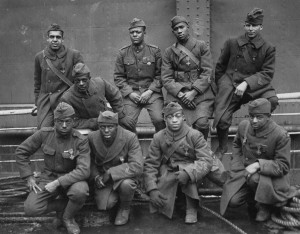 The unit acquired a number of nicknames in the course of its service—the Germans called them the “Harlem Hellfighters.” They were also known as the Black Rattlers and the Men of Bronze. By the end of the war, 171 members of the 369th were awarded the Legion of Honor or the Croix de Guerre, including Pvt. Henry Johnson, who was the first American ever awarded that highest French military honor. They spent 191 days under fire, and never lost a foot of ground.
The unit acquired a number of nicknames in the course of its service—the Germans called them the “Harlem Hellfighters.” They were also known as the Black Rattlers and the Men of Bronze. By the end of the war, 171 members of the 369th were awarded the Legion of Honor or the Croix de Guerre, including Pvt. Henry Johnson, who was the first American ever awarded that highest French military honor. They spent 191 days under fire, and never lost a foot of ground.
N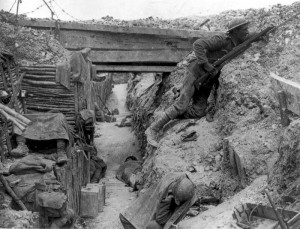 aturally, research on the Great War led me to descriptions of trench warfare. Rather than mere ditches, the trenches were an incredibly elaborate, highly tactical system of earthworks. None of this, however, reduced the horrors of living and fighting in them for years on end. Water constantly flooded the trenches, sometimes as deep as knee-high, requiring pumping crews to drain as much water as possible. The constant wetness led to miserable conditions such as trench foot, and the close quarters meant that vermin were an endless problem. Letters from the front describe rats as big as cats among the millions of rodents that infested the place. By day, soldiers lay low as artillery pounded their positions; by night, both trenches and the No Man’s Land between them sprang to furious action under cover of darkness. Mustard and chlorine gas attacks were common; soldiers practiced holding their breath for six seconds, to cover the four seconds it took to put a mask on.
aturally, research on the Great War led me to descriptions of trench warfare. Rather than mere ditches, the trenches were an incredibly elaborate, highly tactical system of earthworks. None of this, however, reduced the horrors of living and fighting in them for years on end. Water constantly flooded the trenches, sometimes as deep as knee-high, requiring pumping crews to drain as much water as possible. The constant wetness led to miserable conditions such as trench foot, and the close quarters meant that vermin were an endless problem. Letters from the front describe rats as big as cats among the millions of rodents that infested the place. By day, soldiers lay low as artillery pounded their positions; by night, both trenches and the No Man’s Land between them sprang to furious action under cover of darkness. Mustard and chlorine gas attacks were common; soldiers practiced holding their breath for six seconds, to cover the four seconds it took to put a mask on.
How morale could be anything but abysmal was entirely beyond my imagination.
With all this research fresh in mind, I headed down to the 4th Precinct of the Minneapolis Police Department, located just three blocks from the spot in North Minneapolis where cops shot an unarmed, possibly handcuffed man named Jamar Clark on early Sunday morning. Community members and activists against police violence gathered Monday to protest yet another extrajudicial killing of a black man. Members of Black Lives Matter Minneapolis occupied the front entrance, and a little camp sprang up around the precinct.
The rain started in earnest on Tuesday, and by the time I got there to join a knitting circle at the occupation, things were pretty swampy. I brought some wooden pallets to lift supplies out of the mud, as well as hand warmers, hygiene supplies, and some cocoa butter and hair grease (the revolution will not be ashy). Campfires in metal braziers smoked in the drizzle, and tents, tarps, and plastic ponchos offered a little protection from the weather. The foyer of the precinct was a cozy nest of blankets and pillows for the half-dozen people holding it down.
Despite the weather, despite the constant threat of escalating violence, everyone was cheerful. We all had a purpose, even if it was just to be part of the crowd. Those who couldn’t stay brought welcome deliveries of hot food, dry socks, and coffee. Folks stopped by our little craft spot and took knitting lessons, or looked over my shoulder to read the message I was cross-stitching as gifts for friends. The sense of community and purpose was unmistakeable.
That community felt very different yesterday, when people rushed to reinforce the occupation after Minneapolis police literally threw the people in the foyer out onto the pavement, then attempted to trash all the tents and supplies. I got there as soon as I could, and went right to work as a chant leader for the next three and a half hours. Sometimes I screwed up, and everyone laughed along with me as I joked, “White lady can’t chant.” Between upbeat chants I gave lessons in how to use milk or antacid to wash pepper spray from their eyes, as police continued to escalate tensions.
We blocked access points, raised tarps in front of gates in an effort to protect against possible chemical agents, and kept chanting. The rain poured down; SWAT teams circled the block in vans with armed officers hanging out the cargo doors to intimidate. The smell of tear gas from other parts of the occupation hung acrid in the air.
And yet, while sometimes angry and confrontative, the crowd remained mostly peaceful. My fellow marshals grinned fiercely when we crossed paths. The demonstrators stayed relentlessly cheerful. At the west gate where I was marshaling and directing traffic, a dozen young protestors traded chants for freestyling and dancing. A young man came around with a huge tray of spicy fried chicken that bolstered everyone’s spirits (important lesson learned: I don’t look very authoritative while directing traffic with fried chicken in hand). A grandmother kept bringing her golf umbrella over to me, protecting me from the rain while she lectured me about going without a hat.
And suddenly, I knew how those soldiers in the trenches kept their morale up. The power of sharing even miserable experiences with people who stand for what you stand for is almost intoxicating. As rough as it gets, as uncomfortable, as frightening, you know you’ll be able to say where you were when people ask you what you did when the crucial moment arrived. Even if it’s just to hold an arbitrary line, you did something indispensable. We’ll have the stories of the mud and the rain and the campfire smoke and the camaraderie.
Nobody’s going to get a Croix de Guerre out of this. Most likely, none of us will end up with a badass name and reputation like the Harlem Hellfighters. But we’ll always know we fought for our value, even for our country—the country that values black lives as much as white ones, women as much as men, queer as much as straight, poor as much as rich. And that’s better than any medal.
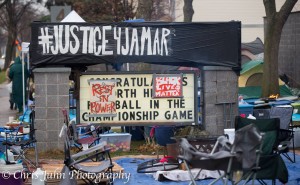
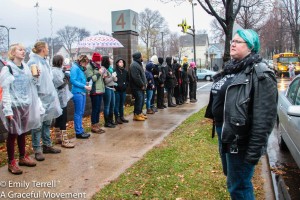
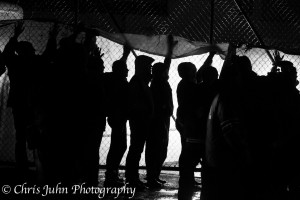
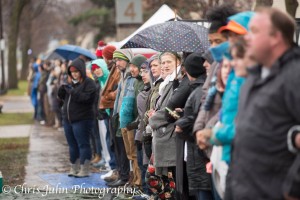
I held my breath, it invoked my imagination- vividly, and emotionally, like that person who receive a community outpouring after a fire… I am renewed in my faith for humanity, by your pristine and tender observation, and moved beyond this moment. Thank you for this reminder, the glimpse into where the solutions lie, and for the lingering thoughts to also bring artistry, and altruism to the forefront in combatting what ails the world today.